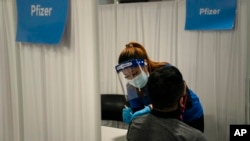The director of the U.S. Centers for Disease Control and Prevention has approved Pfizer vaccine booster shots for some individuals who completed their first vaccinations at least six months ago.
Frontline workers – teachers, healthcare workers and others whose jobs place them at risk of contracting COVID-19 – will be able to get the boosters, in addition to people 65 and older, nursing home residents, and other people, aged 50 to 64, with underlying conditions
Rochelle Walensky added the frontline workers late Thursday to the list of those eligible for the boosters prepared by a CDC’s advisory panel.
The U.S. Food and Drug Administration on Wednesday approved a third dose of the Pfizer vaccine for people 65 and older, those at high risk of severe disease and people who are routinely exposed to the coronavirus.
The European Union’s drug watchdog said Thursday it plans to decide in early October whether to approve a third dose of the Pfizer-BioNTech COVID-19 vaccine for those over age 16.
The European Medicines Agency first approved a two-dose process but said breakthrough infections in those already vaccinated had added urgency to its review of a third dose for people 16 and older, six months after being fully vaccinated.
African leaders on vaccine inequity
"It is an indictment on humanity that more than 82% of the world's vaccine doses have been acquired by wealthy countries, while less than 1% has gone to low-income countries," South African President Cyril Ramaphosa said in a video address to the United Nations General Assembly.
The African Centers for Disease Control and Prevention reports that 4% of Africa's population is fully vaccinated.
"The hoarding and inequitable distribution with the resultant uneven vaccination patterns across the globe is not acceptable," Zimbabwean President Emmerson Mnangagwa said in a prerecorded message. "Vaccine nationalism is self-defeating and contrary to the mantra that 'no one is safe until everyone is safe.' Whether in the global North or South, rich or poor, old or young, all people of the world deserve access to vaccines."
Antibodies passed to babies
Pregnant women who are vaccinated against COVID-19 also pass on the coronavirus antibodies to their unborn children, according to a new study published this week in the American Journal of Obstetrics and Gynecology: Maternal-Fetal Medicine.
Researchers at New York University’s Grossman School of Medicine examined 36 newborns whose mothers received either the Pfizer or Moderna two-dose vaccine regimen before giving birth, and found that every baby had antibodies when delivered.
The study did not determine how well the babies were protected from COVID-19, the illness caused by the virus, or how long the protection might last.
Scientists have discovered that pregnant women develop antibodies in response to a vaccine or an infection, then pass them on to their babies either through the umbilical cord or breast milk.
“Studies continue to reinforce the importance of vaccines during pregnancy and their power to protect two lives at once by preventing severe illness in both mothers and babies,” said Dr. Ashley Roman, one of the study’s principal investigators.
The U.S. Centers for Disease Control and Prevention last month urged pregnant women and women who were recently pregnant to get vaccinated for COVID-19, saying there is mounting evidence that the benefits of the shot far outweigh any known or potential risks.
Meanwhile, a new study published in the medical journal Nature Communications found that some COVID-19 patients develop so-called “autoantibodies,” or self-destructive antibodies, that could trick the immune system into attacking otherwise healthy tissue and cause inflammatory diseases. Scientists at Stanford University found autoantibodies in blood samples of at least 50% of nearly 150 patients admitted for treatment of COVID-19, compared to 15% of 41 healthy volunteers.
The researchers found the antibodies have the potential to aggravate the symptoms of COVID-19.
The foundation that awards the Nobel Prizes announced Thursday that its annual banquet for the laureates in Stockholm has been canceled for the second consecutive year due to the pandemic. The Nobel Foundation said the winners for medicine, physics, chemistry, literature, peace and economics will receive their medals and diplomas in their home countries.
In a statement announcing the decision, the foundation said, “Everybody would like the COVID-19 pandemic to be over, but we are not there yet.”
Some information for this report is from the Associated Press.






